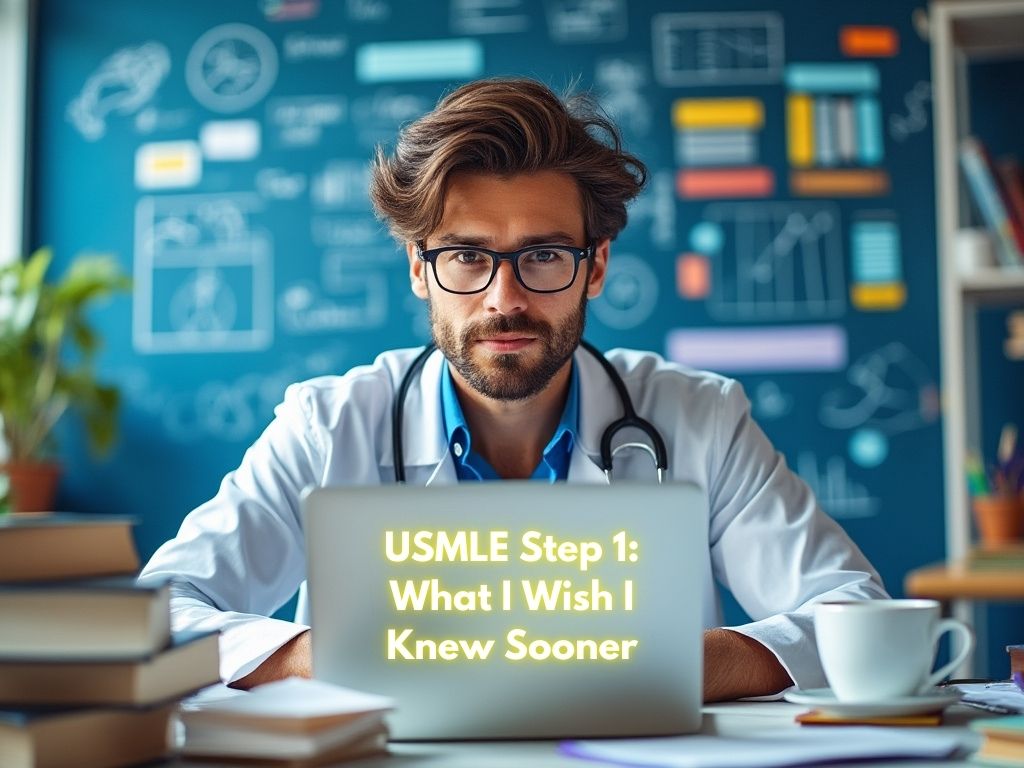Preparing for USMLE Step 1: What I Wish I Knew Sooner

Preparing for USMLE Step 1: What I Wish I Knew Sooner
It’s crunch time. You’re juggling clinical rotations, practice questions, and desperately trying to find a way to maintain some semblance of balance in your life. Welcome to your third year of medical school, and if you’re like most students, you’re probably feeling the pressure of Step 1 looming large.
Don’t worry—you’re not alone. Every student before you has been right where you are now, and just like you, they’ve found themselves thinking, “I wish I had known that sooner.”
The Power of Practice Questions
Here’s something no one tells you enough: practice questions are your best friend. Research shows a direct link between the number of questions you complete and how well you’ll do on Step 1.
You might think you’re solid with textbooks and flashcards, but practice questions? That’s where the magic happens.
Even if it feels like you’re floundering sometimes, trust the process—more questions lead to better results.
Ever found yourself stuck wondering, “How can I get more out of my study time?” The answer is simple: do more questions.
Study Smarter, Not Harder
We’ve all been there, right? Staring at the same set of notes for hours, hoping that somehow, by sheer force of will, the information will stick. Spoiler: it won’t.
Step 1 isn’t about regurgitating facts—it’s about learning how to think like a doctor. The more you understand how the body works as a system, the more prepared you’ll be.
Memorizing flashcards might feel good in the short term, but you’ll soon realize it’s not enough. The exam is designed to make you think critically, not just recall facts.
The Unexpected Clinical Relevance
You might think Step 1 is just an academic exercise, a hoop to jump through before the “real” work begins. Wrong. The material you’re cramming into your brain now? You’ll see it again on clinical rotations.
Ever been in the middle of a case and realized, “Oh wait, I actually know this!”? Yeah, it happens. Suddenly, all those hours of studying feel worthwhile because you’re applying what you’ve learned in real life. Keep that in mind when the going gets tough—it’s not just for the test. It’s for your future patients too.
The Psychological Game
Let’s be real for a second: Step 1 is as much a mental marathon as it is an academic one. The stress, the pressure, the anxiety of feeling like you’re constantly behind—it’s all part of the package.
Comparing yourself to your classmates? It’s a trap, and one that’s easy to fall into. But everyone’s study style is different, and what works for them may not work for you.
Keep your head down, focus on your own progress, and take comfort in the fact that no two journeys are the same.
The Financial Reality
Let’s talk about the money. Preparing for Step 1 isn’t just time-consuming; it’s expensive. Between the cost of the exam itself, the subscriptions to study platforms, and all the other little expenses that pile up, it adds up fast.
Some students report spending close to $2,000 just to prepare. Does that sting? Absolutely. But is it worth it in the long run? Most students seem to think so. Just keep this in mind when you’re planning your budget—it’s not just the emotional toll of Step 1 you’ll need to prepare for.
Time Management is Key
It’s one thing to know you need to study; it’s another to actually find the time. Between clinical rotations, final exams, and a personal life (ha, what’s that?), managing your time is no joke. The trick is to stay flexible. Sure, create a structured schedule, but be ready to pivot when unexpected tasks come up.
It’s all about balance. Feeling overwhelmed? It’s completely normal. Take a breath, make a plan, and adjust as needed. You’ve got this.
The Exam Day Experience
Let’s talk logistics. The morning of the exam, it’s not just about what you know—it’s about how prepared you are for the day itself. Our very own Dr. Tao Le regularly shares insights into the exam day experience at his ‘The Path to USMLE Success’ webinars – you can enjoy recordings here!
Show up early. Know the break policies. Plan for security checks. These little things might seem trivial, but on a day as stressful as Step 1, anything that reduces your anxiety is worth its weight in gold.
Here’s a fun fact: you’re allowed to use study materials and even leave the premises for lunch during breaks. Small victories, right?
The Bigger Picture
In the grand scheme of things, Step 1 is just one part of your medical journey. It’s important, no doubt, but it doesn’t define your entire career. A wise student once said, “Step 1 is just a comma in your journey, not a period.” Keep that in mind as you study, and remember—you’re going to be an incredible doctor, whether you ace this test or not.
Citations:
- https://www.ncbi.nlm.nih.gov/pmc/articles/PMC4975378/
- https://usmleagle.com/usmleagle-testimonials/
- https://medschoolinsiders.com/medical-student/wish-i-knew-before-usmle-step-1/
- https://www.progresswithjess.co.uk/post/my-usmle-step-1-experience
- https://www.ncbi.nlm.nih.gov/pmc/articles/PMC8368851/
- https://elitemedicalprep.com/5-study-tips-for-usmle-step-1/
- https://www.insidethematch.com/medical-school-tips/i-wish-i-knew-before-taking-the-usmle-exams
- https://usmlepreps.com/blog/news_content/40-usmle-success-stories-interviews-with-top-scorers-proven-strategies-and-insights-for-high-scores
